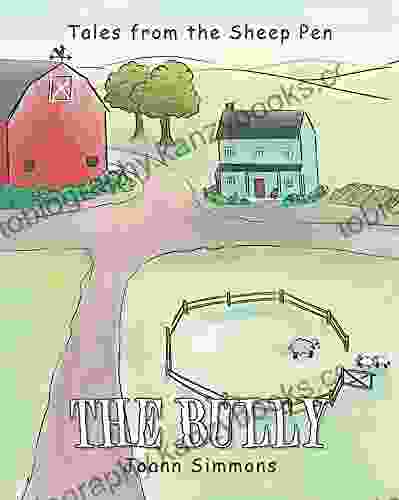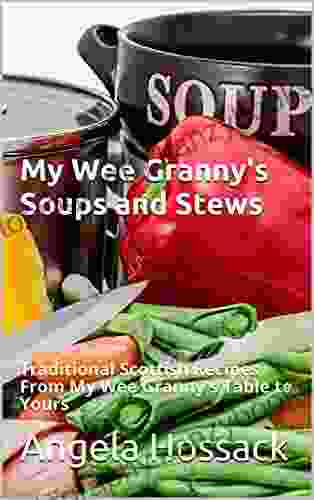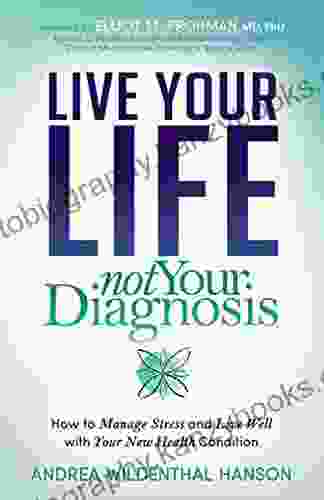How the Food Revolution has Transformed Our Lives, Our Bodies, and Our World: A Comprehensive Exploration

In the tapestry of human history, food has played an integral role, shaping our societies, cultures, and even our bodies. From the primitive days of hunting and gathering to the modern era of industrial agriculture and scientific innovation, our relationship with food has evolved dramatically. In "How the Food Revolution Has Transformed Our Lives, Our Bodies, and Our World," Joan Gussow, an eminent ecologist and food activist, takes a deep dive into this fascinating subject.
The Dawn of Agriculture
The advent of agriculture marked a pivotal turning point in human history. As humans transitioned from nomadic hunter-gatherers to settled farmers, they established a more stable and predictable food supply. The cultivation of crops and domestication of animals led to increased productivity and population growth, laying the foundation for the formation of complex societies.
4.5 out of 5
| Language | : | English |
| File size | : | 4599 KB |
| Text-to-Speech | : | Enabled |
| Screen Reader | : | Supported |
| Enhanced typesetting | : | Enabled |
| X-Ray | : | Enabled |
| Word Wise | : | Enabled |
| Print length | : | 347 pages |
However, the transition to agriculture also brought about significant changes in human physiology and social dynamics.
- Dental health: The shift from a diet rich in raw, fibrous foods to one dominated by processed grains and sugary fruits led to an increase in tooth decay.
- Nutritional deficiencies: As societies became increasingly reliant on a limited number of crops, they faced the risk of nutritional deficiencies, particularly in vitamins and minerals.
- Social inequality: The control of food resources gave rise to social stratification and the emergence of elites who monopolized access to food.
Despite these challenges, agriculture provided a foundation for human civilization and laid the groundwork for subsequent food revolutions.
The Industrial Food System
The 19th and 20th centuries witnessed a profound transformation in food production and distribution. The Industrial Revolution brought about new technologies and techniques that enabled the mass production, processing, and transportation of food. The emergence of the modern food industry revolutionized the way we eat, creating a highly centralized and globalized food system.
While the industrial food system has undoubtedly increased food availability and convenience, it has also come with its own set of challenges:
- Environmental degradation: Industrial agriculture relies heavily on synthetic fertilizers and pesticides, which have contributed to soil degradation, water pollution, and biodiversity loss.
- Health concerns: Processed foods often contain high levels of unhealthy fats, sugars, and sodium, which can lead to chronic diseases such as obesity, heart disease, and diabetes.
- Social injustice: The industrial food system has led to a consolidation of power in the hands of a few large corporations, often at the expense of small farmers and rural communities.
The industrial food system has significantly altered our relationship with food, both positive and negative.
The Ecological Imperative
In recent decades, there has been a growing awareness of the environmental and health consequences of the industrial food system. Consumers are becoming increasingly concerned about the sustainability and safety of their food, leading to a resurgence of interest in local, organic, and traditional food practices.
The ecological imperative calls for a fundamental shift in our food system, one that prioritizes environmental stewardship, health promotion, and social equity. This includes:
- Reducing reliance on synthetic inputs: Adopting sustainable farming practices such as agroforestry, organic farming, and regenerative agriculture.
- Promoting biodiversity: Protecting and restoring ecosystems that support food production, including diverse crop varieties and habitats for pollinators.
- Building resilient food systems: Creating local food networks, supporting small farmers, and investing in urban agriculture.
The ecological imperative offers a path towards a more sustainable and healthy future for our planet and its people.
The Future of Food
The future of food is uncertain. However, there are several emerging trends that may shape the way we eat in the years to come:
- Precision agriculture: Using data and technology to optimize crop yields and reduce environmental impact.
- Alternative protein sources: Exploring plant-based proteins, cultured meats, and insect-based foods to meet growing demand for protein.
- Personalized nutrition: Tailoring diets to individual needs based on genetics, health status, and personal preferences.
- Food as medicine: Recognizing the therapeutic potential of food in disease prevention and management.
These emerging trends have the potential to address the challenges of the industrial food system and create a more sustainable, healthy, and equitable food future.
The Power of Food Literacy
At the heart of the food revolution is the need for food literacy. This encompasses the knowledge, skills, and attitudes that enable individuals to make informed decisions about food. Food literacy empowers consumers to:
- Understand the complexities of the food system
- Make healthy and sustainable food choices
- Advocate for policies that promote a just and equitable food system
Promoting food literacy is essential for creating a transformative food revolution that benefits our health, our planet, and future generations.
The food revolution is an ongoing story, one that has shaped the course of human history and continues to impact our lives today. From the dawn of agriculture to the modern era of industrial food production, our relationship with food has undergone profound transformations.
As we navigate the challenges and opportunities of the 21st century, it is imperative that we embrace an ecological imperative and foster food literacy. By ng so, we can create a sustainable, healthy, and equitable food future for ourselves and generations to come.
4.5 out of 5
| Language | : | English |
| File size | : | 4599 KB |
| Text-to-Speech | : | Enabled |
| Screen Reader | : | Supported |
| Enhanced typesetting | : | Enabled |
| X-Ray | : | Enabled |
| Word Wise | : | Enabled |
| Print length | : | 347 pages |
Do you want to contribute by writing guest posts on this blog?
Please contact us and send us a resume of previous articles that you have written.
 Book
Book Novel
Novel Page
Page Chapter
Chapter Text
Text Story
Story Genre
Genre Reader
Reader Library
Library Paperback
Paperback E-book
E-book Magazine
Magazine Newspaper
Newspaper Paragraph
Paragraph Sentence
Sentence Bookmark
Bookmark Shelf
Shelf Glossary
Glossary Bibliography
Bibliography Foreword
Foreword Preface
Preface Synopsis
Synopsis Annotation
Annotation Footnote
Footnote Manuscript
Manuscript Scroll
Scroll Codex
Codex Tome
Tome Bestseller
Bestseller Classics
Classics Library card
Library card Narrative
Narrative Biography
Biography Autobiography
Autobiography Memoir
Memoir Reference
Reference Encyclopedia
Encyclopedia Alana Reeves
Alana Reeves Debby Hayes
Debby Hayes Andrea Stewart
Andrea Stewart Stu Mittleman
Stu Mittleman Steve Nobel
Steve Nobel Joe Yonan
Joe Yonan Andrew Parr
Andrew Parr Alice Space
Alice Space Randall Fitzgerald
Randall Fitzgerald Ignacja Glebe
Ignacja Glebe Andrew Clements
Andrew Clements Andrew Townsend
Andrew Townsend Wise Betty
Wise Betty Ashley Kalym
Ashley Kalym Andrew Carmellini
Andrew Carmellini Susan Whetzel
Susan Whetzel Tadashi Ono
Tadashi Ono Debbie Moose
Debbie Moose Jesse Adams
Jesse Adams Andrew Heffernan
Andrew Heffernan
Light bulbAdvertise smarter! Our strategic ad space ensures maximum exposure. Reserve your spot today!

 Ibrahim BlairThe Science Behind Positive Vibrations: Unlocking the Secrets of Toxic Energy...
Ibrahim BlairThe Science Behind Positive Vibrations: Unlocking the Secrets of Toxic Energy...
 Scott ParkerThe Ascended Realm Condemning the Heavens: A Literary Odyssey into the Depths...
Scott ParkerThe Ascended Realm Condemning the Heavens: A Literary Odyssey into the Depths...
 José SaramagoGluten Free Sa Baking And Other Treats: A Comprehensive Guide to Delicious...
José SaramagoGluten Free Sa Baking And Other Treats: A Comprehensive Guide to Delicious... Emmett MitchellFollow ·4.2k
Emmett MitchellFollow ·4.2k Mario Vargas LlosaFollow ·13.4k
Mario Vargas LlosaFollow ·13.4k Yukio MishimaFollow ·18.4k
Yukio MishimaFollow ·18.4k Banana YoshimotoFollow ·6.2k
Banana YoshimotoFollow ·6.2k Federico García LorcaFollow ·9.6k
Federico García LorcaFollow ·9.6k Bryce FosterFollow ·19.7k
Bryce FosterFollow ·19.7k Langston HughesFollow ·14.7k
Langston HughesFollow ·14.7k DeShawn PowellFollow ·14.9k
DeShawn PowellFollow ·14.9k

 Emilio Cox
Emilio CoxAncient Wisdom for Your Healthy, Happy, and Beautiful...
In our fast-paced modern world, it can be...

 Justin Bell
Justin BellThe Bully Tales From The Sheep Pen: A Must-Read for...
Bullying is a...

 Duane Kelly
Duane KellyWhat Cancer Taught Me About Living And Dying: A Journey...
In "What Cancer Taught Me About Living...

 David Peterson
David PetersonMy Wee Granny's Soups and Stews: A Culinary Tapestry of...
Are you longing for the...

 Lee Simmons
Lee SimmonsEmbark on a Culinary Adventure with "Deviled Eggs: 50...
: Unlocking the Delectable World of...
4.5 out of 5
| Language | : | English |
| File size | : | 4599 KB |
| Text-to-Speech | : | Enabled |
| Screen Reader | : | Supported |
| Enhanced typesetting | : | Enabled |
| X-Ray | : | Enabled |
| Word Wise | : | Enabled |
| Print length | : | 347 pages |








